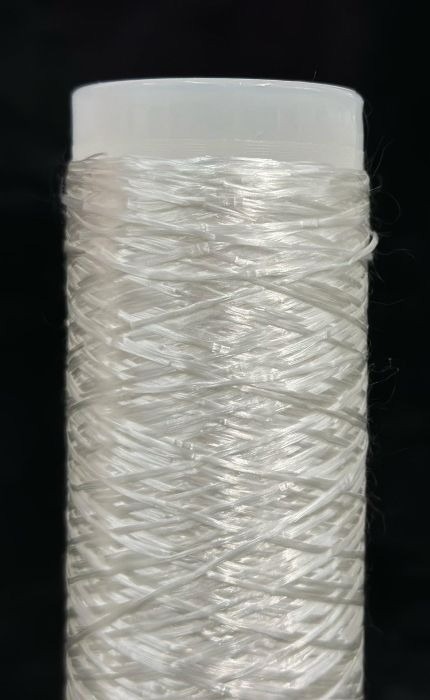Epson and The Hong Kong Research Institute of Textiles and Apparel (HKRITA) have succeeded in developing new regenerated cellulose fiber with a silk-like sheen from waste cotton fabric through a new production process.
 Newly developed regenerated cellulose fiber yarn. Image Credit: Epson
Newly developed regenerated cellulose fiber yarn. Image Credit: Epson
A movement toward using fibers recycled from discarded clothing has been gaining momentum, driven by a growing recognition of waste clothing as a global environmental issue. In Europe in particular, a move is under way to use more regenerated fiber and reduce textile waste.
To address societal issues surrounding textile waste HKRITA and Epson have been conducting research and development on regenerated fibers since signing a joint development agreement in January 2024. As a result of this collaboration, the partners have successfully developed regenerated cellulose fiber using a new production process that transforms discarded cotton fabric into regenerated fiber.
This new process was made possible by integrating Epson's proprietary Dry Fiber Technology for defibrating textiles with HKRITA's fiber-dissolving technology.
The process involves (1) defibrating discarded cotton fabric into a powder-like state, (2) dissolving the cotton in a solvent and (3) extruding it through a nozzle into a coagulation bath, where it solidifies and is spun into fiber.
The regenerated cellulose fiber produced through this process is expected to have both a smooth, silky sheen and the strength of cotton. This fiber is expected to be used in high-end materials such as scarves, neckties, and suit linings.
Moreover, since the short fibers that occur during the regenerated fiber production process can also be used rather than discarded, as was usually the case, this regeneration process can help to increase the total clothing recycling rate.
"As an applied research center, HKRITA is dedicated to solving real-world problems and enhancing current practices and products," said HKRITA CEO Jake Koh. "We are thrilled to collaborate with Epson to recycle fibers and repurpose them into high-quality yarns. This cross-industrial collaboration is not only reimagining materials but also redefining the future of sustainable production."
Epson Executive Officer Satoshi Hosono, who serves as the deputy general administrative manager of the Global Environmental Strategy Promotion Office and as the deputy general administrative manager of the Technology Development Division, said, "We are extremely pleased with the results that this joint development project has yielded. The selective application of this new wet process and our previously developed dry process should enable fiber to be regenerated from all waste cotton fabrics while reducing environmental impact."
Looking ahead, HKRITA and Epson will continue to combine their advanced technologies to accelerate the adoption of regenerated fibers, contributing to global efforts to solve the challenge of clothing recycling.